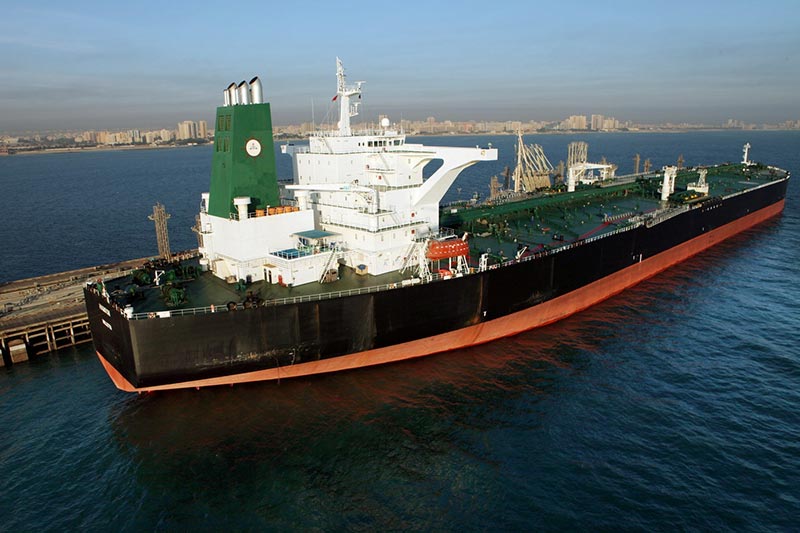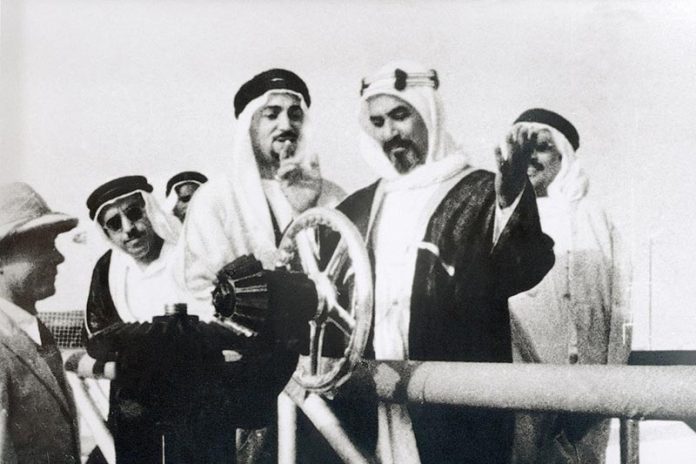One turn of a silver wheel on the morning of 30 June 1946, by the then ruler of Kuwait Sheikh Ahmad Al-Jaber, was what it took to initiate the first shipment of oil from Kuwait.
The wheel turning event, witnessed by a large contingent of Kuwait Oil Company officials and other dignitaries, released a valve that sent the first shipment of nearly 10,000 tons of crude oil flowing through an offshore oil pipeline to the ‘British Fusilier’, an oil tanker waiting out at sea. It was this fateful shipment on that day 77 years ago which sealed the emergence of Kuwait as a major global oil producer and exporter, a status the country has proudly maintained through the years since then.
Nearly a decade earlier, in December 1934, Sheikh Ahmad Al-Jaber Al-Sabah, signed an agreement with Kuwait OIl Company (KOC) — formed through a deal between Gulf Oil Corporation (presently Chevron Oil) and the Anglo-Persian Oil Company (presently British Petroleum) — to explore for oil in the country.
Preliminary drilling operations during the 1936-38 period revealed that the land was rich in oil wealth, and in 1938 KOC hit paydirt with the discovery of a huge reservoir of oil in the Burgan Field in southeastern Kuwait. However, further prospecting and oil drilling were suspended with the outbreak of World War II. Following the end of the Second World War and increasing demand for oil, Kuwait began resuming oil drilling activities.

The discovery of oil propelled Kuwait from an insignificant patch of desert land at the northern tip of the Arabian Gulf, into a country of significance in the region and on the international stage. Starting in the early 1950s a spate of mega construction activities took place in the country with Kuwait building several public utilities, including new roads and hospitals, as well as implementing new developments and reforming local administration.
The High Executive Committee was formed in 1954, and the Supreme Council and the Organizational Authority in 1956; local government councils such as the Education Council, City Council and Health Council were also formed during this period. In 1959 Kuwait also took steps to enact laws and establish systems such as the Naturalization Law in 1959, the Kuwaiti Currency Law, and the Passports Law and the Organization of Government Departments in 1960. During this period, discussions on full independence for the country began to be voiced, and calls for abrogating the protectorate status with Great Britain and transforming Kuwait into a sovereign nation gathered momentum under the leadership of Sheikh Abdullah Al-Salem Al-Sabah.
Sheikh Abdullah Al-Salem Al-Sabah, who had been the chairman of the country’s first council in 1938, realized that the protectorate agreement was no longer appropriate in the wake of rapid social, political, and economic changes that were taking place in the country, as well as regionally and across the wider world.
There was also a growing consensus among the people against remaining restricted by the Anglo-Kuwaiti protectorate agreement that had been signed in 1899. The protectorate agreement was signed by Kuwait’s then ruler Sheikh Mubarak Al-Sabah and the British government in India, to ward off threats to Kuwait’s independence from the Ottoman Empire. In line with this thinking, Sheikh Abdullah Al-Salem Al-Sabah, expressed his desire to the British government to replace the old protectorate agreement with a new friendship agreement.
The British government accepted Kuwait’s demand and diplomatic notes were exchanged between Sir William Luce, the British Political Resident in the Arabian Gulf, and Sheikh Abdullah Al-Salem Al-Sabah. On 19 June,1961 Kuwait was granted full independence. A draft constitution was approved on 11 November 1961, outlining Kuwait’s system of governance as a “fully independent Arab State with a democratic style of government, where sovereignty rests with the nation, which is the source of power”. A few months after independence, Sheikh Abdullah Al-Salem, gave instructions for the formation of a popular committee to draft a modern constitution for independent Kuwait.
Under the terms of the newly drafted constitution, Kuwait held its first parliamentary elections in 1963, becoming the first Arab state in the region to establish a constitution and parliament. Government departments were restructured so as to enable implementing the overall development plan. Most of the cabinet members were chosen from among the elected members of the national assembly which comprised fifty members.
In the two decades following independence, Kuwait emerged as the most developed country in the region. Kuwait became the first country in the world to set up a sovereign wealth fund with the establishment in 1959 of the Kuwait Investment Board (KIB) in London to invest surplus oil revenue and reduce Kuwait’s reliance on a single finite resource. In the wake of independence, the KIB evolved into the Kuwait Investment Office (KIO) in 1965 and later into its current form as the Kuwait Investment Authority in 1982.
In the 1970s and for over a decade Kuwait scored highest of all Arab countries on the Human Development Index, and Kuwait University , which was founded in 1966, gained attention for its academic quality and intellectual freedom that it attracted students from around neighboring countries.
On the cultural front, Kuwait’s theater industry was held in high esteem throughout the Arab world and considered a pioneer in introducing innovative and experimental ideas and techniques on stage. Meanwhile, the media in the country was reputed to be among the freest in the Middle East, openly criticizing and questioning prevailing social, political and religious mores. Kuwait was also home to a literary renaissance with the country’s magazine, Al Arabi, first published in 1958 going on to become the most popular Arabic magazine in the Middle-East.
Looking around today, one can only wonder why Kuwait remains only a pale shadow of its former glorious days.

















